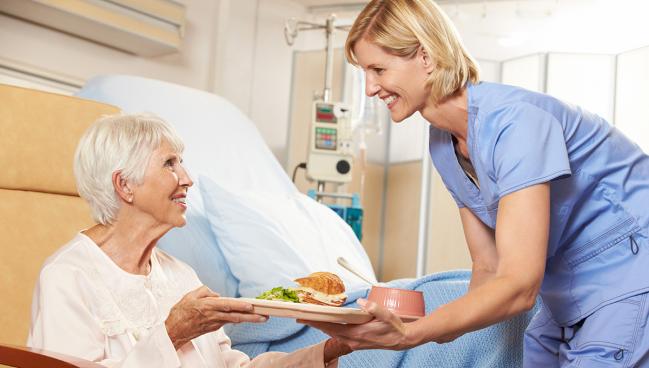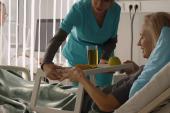More Data Diminish Support for Cath Lab Fasting Rules: SCOFF
The trial adds to a spate of recent studies showing no safety concerns with eating and drinking before cardiac procedures.

A pragmatic, multicenter trial of patients undergoing cardiac procedures and device implantations provides further support for doing away with routine fasting requirements.
In the SCOFF trial, patients who were allowed food and liquids up to the time of the procedure had no increase in the risk of adverse events such as aspiration pneumonia compared with those who abstained from food and liquids as directed.
David Ferreira, BMed (John Hunter Hospital, Newcastle, Australia), presenting the data in a Hot Line session at the recent European Society of Cardiology Congress 2024, said based on the SCOFF results “we're moving to change our practice and indeed there are centers already who have removed fasting requirements.”
SCOFF, simultaneously published in the European Heart Journal, adds to data from the CALORI trial and CHOW NOW, which both found no safety issues in patients who were allowed unrestricted oral intake before a cardiac catheterization compared with those randomized to nothing by mouth. Earlier this year, TCTMD also reported on a single-center study from Indiana in which patients allowed to eat liberally from a heart-healthy menu—literally up to the time of entering the cath lab—had no increase in risk of adverse events and were more satisfied with their experience due to less hunger and thirst.
To TCTMD, Ferreira said despite being an important clinical question in interventional cardiology, it’s unclear why it’s taken until now to ask whether fasting is even necessary. CHOW NOW essentially set the stage for this line of enquiry when it was presented as an abstract at a meeting just 5 years ago.
“Almost 4,000 patients in some of these observational studies: not one episode of aspiration,” Ferreira said. “I don't know why [it’s taken so long], but thankfully we're getting the data now.”
The American Society of Anesthesiologists 2023 practice guideline recommends a preoperative fasting period of 6 hours for solid food and 2 hours for clear liquids for patients undergoing procedures involving anesthesia or sedation. The primary reason for the fasting requirement is to reduce the risk of aspiration, although Ferreira said there are no outcome data to support this practice in conscious sedation.
Following Ferreira’s presentation, session chairperson Roxana Mehran, MD (Icahn School of Medicine at Mount Sinai, New York, NY), said while the evidence appears strong with regard to diagnostic procedures, she’s not convinced SCOFF was powered to detect safety in complex procedures.
Ferreira believes that SCOFF and the other recent data taken together send a consistent message that “reducing fasting requirements does not associate with patient adverse events and associates with improved patient satisfaction.”
He also pointed to another recent trial of fasting versus nonfasting that included patients with chronic total occlusions and found no increase in adverse events in those not required to fast before their procedure.
More Hypotension and Hyperglycemia With Fasting
For SCOFF, Ferreira and colleagues enrolled 716 patients (mean age 69 years; 35% women) from six sites in New South Wales, Australia. All patients were scheduled to undergo planned coronary interventions or were receiving an implantable cardiac device or related procedure, such as a lead revision or generator change.
Approximately 27% of study participants had diabetes. Those who were randomized to the nonfasting arm were told to take their usual insulin doses, while those randomized to the fasting arm were instructed to omit morning short-acting therapy but continue long-acting insulin at 100% of the usual dose. Morning mixed insulin doses were halved.
According to Ferreira , patients randomized to the nonfasting arm were encouraged to eat and drink as they pleased to mimic their typical meal intake. The fasting group had been without solid food for an average of about 10 hours longer than the nonfasting group and without clear liquids for about 4.5 hours longer.
The primary composite outcome of the occurrence of aspiration pneumonia, hypotension, or hyperglycemia occurred in 19.1% of the fasting group and 12% of the nonfasting group, meeting requirements for both noninferiority and superiority for the primary composite outcome in favor of the nonfasting strategy. Additionally, sensitivity analyses of the primary outcome were consistent with the main analysis for noninferiority and superiority.
Among the primary outcome events, Ferreira noted that hypotension occurred in 8.9% of the fasting group versus 6.1% of the nonfasting group, and hyperglycemia occurred in 8.4% and 6.5%, respectively. These appeared to be the drivers of the difference in the primary composite outcome.
The absolute risk difference between groups was 7.1% in favor of nonfasting, with a number needed to treat of 14.1 to prevent one primary outcome event.
While there were no differences in various secondary outcome events between the fasting and nonfasting groups, patient satisfaction was better in the nonfasting arm .
Ferreira said the study team attempted to collect content and quantity of food consumed in the nonfasting group, but it proved difficult and the SCOFF investigators acknowledge this as a limitation of the study. Another potential limitation is that patients were unblinded, which is likely to have influenced patient reported satisfaction, he said.
Annapoorna S. Kini, MD (Mount Sinai Hospital, New York, NY), who served as discussant following the presentation, noted that with current fasting guidelines in place, the incidence of nausea, vomiting, aspiration pneumonia, need for urgent CABG, or intubation is less than 0.1%.
She questioned whether nausea and vomiting should have been added to the primary outcome endpoint, but agreed that SCOFF builds on accumulating evidence that routine fasting may not be necessary.
Kini also noted that since gastric emptying times can vary, particularly in those with comorbidities, a reasonable practice change might be to suggest that patients not required to fast “have a lighter meal rather than a heavier protein and high-fat meal before going into cardiac catheterization.”
TCTMD Editor-in-Chief Shelley Wood contributed to this article.
L.A. McKeown is a Senior Medical Journalist for TCTMD, the Section Editor of CV Team Forum, and Senior Medical…
Read Full BioSources
Ferreira D, Hardy J, Meere W, et al. Fasting vs no fasting prior to catheterisation laboratory procedures: the SCOFF trial. Eur Heart J. 2024;Epub ahead of print.
Disclosures
- Ferreira and Kini report no relevant conflicts of interest.





Comments